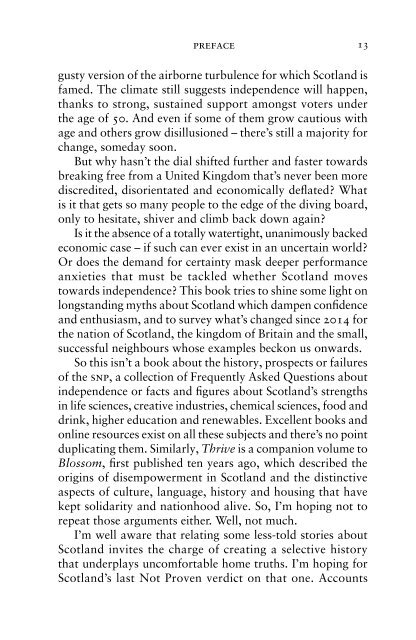Thrive by Lesley Riddoch sampler
Why won’t Scots simmer down? Why batter on about independence when folk voted No a decade back? After all. Scotland’s not as populated as Yorkshire, nor as wealthy as London. But it’s also not as Conservative, as keen on Brexit, or as willing to flog public assets to Tory party pals. So does Nicola Sturgeon’s departure terminally damage the case for independence? The answer, with all respect to her legacy, is no. Scotland has bigger fish to fry. In this book, Lesley Riddoch makes an impassioned call to action, weaving academic evidence with story, international comparison and anecdote to explain why Scotland is ready to step forward as the world’s newest state.
Why won’t Scots simmer down?
Why batter on about independence when folk voted No a decade back?
After all. Scotland’s not as populated as Yorkshire, nor as wealthy as London. But it’s also not as Conservative, as keen on Brexit, or as willing to flog public assets to Tory party pals.
So does Nicola Sturgeon’s departure terminally damage the case for independence?
The answer, with all respect to her legacy, is no.
Scotland has bigger fish to fry.
In this book, Lesley Riddoch makes an impassioned call to action, weaving academic evidence with story, international comparison and anecdote to explain why Scotland is ready to step forward as the world’s newest state.
Create successful ePaper yourself
Turn your PDF publications into a flip-book with our unique Google optimized e-Paper software.
Preface<br />
13<br />
gusty version of the airborne turbulence for which Scotland is<br />
famed. The climate still suggests independence will happen,<br />
thanks to strong, sustained support amongst voters under<br />
the age of 50. And even if some of them grow cautious with<br />
age and others grow disillusioned – there’s still a majority for<br />
change, someday soon.<br />
But why hasn’t the dial shifted further and faster towards<br />
breaking free from a United Kingdom that’s never been more<br />
discredited, disorientated and economically deflated? What<br />
is it that gets so many people to the edge of the diving board,<br />
only to hesitate, shiver and climb back down again?<br />
Is it the absence of a totally watertight, unanimously backed<br />
economic case – if such can ever exist in an uncertain world?<br />
Or does the demand for certainty mask deeper performance<br />
anxieties that must be tackled whether Scotland moves<br />
towards independence? This book tries to shine some light on<br />
longstanding myths about Scotland which dampen confidence<br />
and enthusiasm, and to survey what’s changed since 2014 for<br />
the nation of Scotland, the kingdom of Britain and the small,<br />
successful neighbours whose examples beckon us onwards.<br />
So this isn’t a book about the history, prospects or failures<br />
of the SNP, a collection of Frequently Asked Questions about<br />
independence or facts and figures about Scotland’s strengths<br />
in life sciences, creative industries, chemical sciences, food and<br />
drink, higher education and renewables. Excellent books and<br />
online resources exist on all these subjects and there’s no point<br />
duplicating them. Similarly, <strong>Thrive</strong> is a companion volume to<br />
Blossom, first published ten years ago, which described the<br />
origins of disempowerment in Scotland and the distinctive<br />
aspects of culture, language, history and housing that have<br />
kept solidarity and nationhood alive. So, I’m hoping not to<br />
repeat those arguments either. Well, not much.<br />
I’m well aware that relating some less-told stories about<br />
Scotland invites the charge of creating a selective history<br />
that underplays uncomfortable home truths. I’m hoping for<br />
Scotland’s last Not Proven verdict on that one. Accounts


















